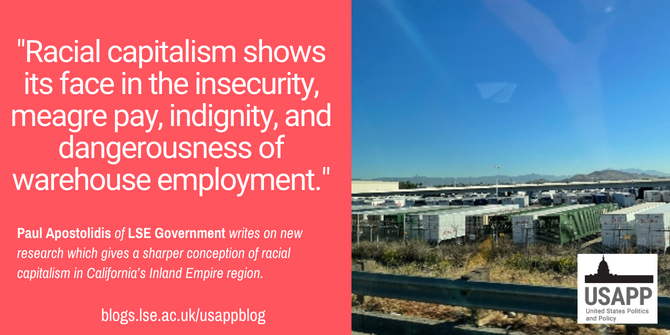 The growth of Amazon, Walmart, and other large firms dependent on sophisticated logistics has also led to the rise of US regions and local employment dominated by warehouses. In new research Paul Apostolidis explores racial capitalism and the warehouse industry’s impact among Latinx communities in California’s Inland Empire region. He writes that among Latinx workers and communities, racial capitalism not only involves insecurity, low pay, and workplace injury risks in warehouse employment, it also denies residents a safe, sanitary, and vibrant home life, undermining the essential basis for their lives to thrive and grow across generations.
The growth of Amazon, Walmart, and other large firms dependent on sophisticated logistics has also led to the rise of US regions and local employment dominated by warehouses. In new research Paul Apostolidis explores racial capitalism and the warehouse industry’s impact among Latinx communities in California’s Inland Empire region. He writes that among Latinx workers and communities, racial capitalism not only involves insecurity, low pay, and workplace injury risks in warehouse employment, it also denies residents a safe, sanitary, and vibrant home life, undermining the essential basis for their lives to thrive and grow across generations.
What does ‘racial capitalism’ mean? Where do we see it manifested in US politics and society? The idea of ‘racial capitalism’ has recently gained a heightened profile in academic circles and public debates. Beginning in 2020 protests led by Black Lives Matter in response to the murder of George Floyd, at the time of Black and other global majority workers’ disproportionate exposure to COVID-19 during the pandemic’s most lethal phase, brought new urgency to America’s ongoing struggles with race. Yet the term ‘racial capitalism’ signals something structural and long-lasting rather than containable within a brief episode of crisis. And given the complexity of racial experience and oppression in the US, understanding racial capitalism there requires looking both within and beyond Black communities.
My research with collaborators in Southern California will strengthen our grasp of how racial capitalism operates and how, and why, it should be contested. Our work takes a concentrated look at Latinx communities in a political and economic landscape shaped by the powerful warehouse industry. This reveals a form of racial capitalism that is partly grounded in labour exploitation but also involves making Latinx ‘social reproduction’ precarious: steadily diminishing the ecological, domestic, educational, and relational capacities that people need to thrive.
The Latinx Futures project and Labour in California’s Inland Empire
The Latinx Futures project, based at the University of California Riverside and supported by the Mellon Foundation, draws attention to an under-analysed region that has become pivotal to the world economy. The ‘Inland Empire’ (IE) is a vast area east of Los Angeles, including the cities of Riverside and San Bernardino as well as the rural Eastern Coachella Valley and extending down to the Mexican border. Earlier eras saw the IE successively covered with cattle ranches, citrus orchards and housing developments for intra-US white migrants yearning for the California ‘dream’ lifestyle of healthiness and material abundance. They arrived in places long inhabited by Mexicans and Mexican Americans whose subordinate social positions dates back to Spanish colonialism and persists even as the regional economy has changed dramatically.
In the past few decades, the IE has achieved new prominence as ground zero for the global logistics industry. Amazon, Walmart and other mega-firms have led massive and ever-expanding warehouse development in the region: there are stretches of freeway where warehouses fill one’s entire view. One way to understand racial capitalism is to look at employment conditions for those who staff the warehouses. At Amazon’s western US warehouses, a mostly Latinx workforce sweats out its hours unloading containers and re-packing goods for transport to retail outlets through ‘just-in-time’ distribution systems. So, we could see ‘racial capitalism’ as naming how logistics operations and the corporations that pioneered them have become primary engines of 21st century capitalist growth and profitability, and how the labour processes on which such expansion depends feature working conditions for Latinx and other global majority workers that are not just unequal to those of whites but profoundly damaging and demoralising.

Image credit: Paul Apostolidis.
Viewed in this way, racial capitalism shows its face in the insecurity, meagre pay, indignity, and dangerousness of warehouse employment. Most people access these jobs through temp agencies, and temp jobs pay poorly (usually under a living wage) and come with no health insurance or retirement benefits. Basic disrespect is another problem. The warehouses are so large that you might need a car to get from one end to the other, and bathrooms are often located so far from workstations that workers resort to urinating in bottles. Occupational safety and health (OSH) hazards, such as repetitive motion injuries and mental health problems, also have proliferated as companies deploy digital surveillance technologies to measure individuals’ quota-fulfilments and ‘time off task,’ as Amazon’s antiseptic lingo puts it. Backed by threats of discipline and termination, these methods have markedly increased occupational safety incidents at Amazon, which monitors its warehouse workers like no other firm and sets a gruesome industry standard.
How racial capitalism harms working-class people outside the workplace
No doubt, we need to examine warehouse labour processes to understand racial capitalism in the IE and elsewhere. Yet as feminist theorists of ‘social reproduction’ argue, capital-valorisation depends – structurally – not only on exploiting wage labour but also on the ‘reproduction’ of working-class people and communities. We should understand ‘reproduction’ here in a broad sense that includes physical rest, rejuvenation and care; emotionally supportive relationships; education and intellectual cultivation; and ecological surroundings conducive to good health. When we look at how the warehouse industry is weakening this essential scaffolding for human, social life among Latinx IE working-class people, further key dimensions of racial capitalism spring into view.
Endlessly churning truck engines, as drivers await pickups at warehouses and clog the freeways, have caused globally standout air pollution levels in the Inland Empire. Grim statistics for respiratory illnesses reflect this general condition of perpetual toxic exposure for residents of this strongly majority-Latinx region. That’s racial capitalism at work, even outside the workplace.
Social reproduction also requires a safe, sanitary and vibrant home life, but the warehouses are making that impossible for more and more Latinx working-class families. Warehouse developers crave more land and are pressuring homeowners to sell their houses, in neighbourhoods that already have giant warehouses on the doorstep. This isn’t just a matter of weighing costs and making deals. It is eroding a distinctive local ‘ranchero’ culture through which Mexican-origin families create conviviality and community on small plots of desert acreage far from pricey L.A. but big enough for weekend barbacoas and a few farm animals. Ranchero living recedes, racial capitalism advances.
Then there’s Amazon’s new ‘school-to-warehouse pipeline,’ built by recruiting workers in high schools and universities. Cynically tempting students and families dispirited by astronomical higher-education costs, this programme comprises yet another feature of racial capitalism in the IE. Again, it isn’t only about channelling Brown and Black bodies into badly paid and hazardous jobs. Racial capitalism, additionally, means collapsing time horizons as future aspirations give way to a treadmill of present needs and demands. It also means depriving young people of intellectual development for its own sake – of learning and critical reflection as part of what makes us human.
The Latinx Futures project is investigating these core aspects of racial capitalism that make Latinx working-class social reproduction more precarious. Notably, we are doing this through partnerships with ‘Latinx civil society’ organisations: groups engaged in local struggles for environmental justice, housing rights and educational equality. Through ‘popular education’ workshops open to the wider community, we aim to craft a sharper conception of racial capitalism in collaboration with those who suffer its worst impacts. Watch this space for updates.
- This project was supported by the Phelan US Centre through a 2021-22 Undergraduate Research Assistantship. Read Undergraduate Research Assistant, Fernanda Alvarez Piñeiro’s report on the project: Latinx Futures: The Civil, Cultural and Political Stakes for Southern California Latinx Communities.
Please read our comments policy before commenting.
Note: This article gives the views of the authors, and not the position of USAPP – American Politics and Policy, nor the London School of Economics.
Shortened URL for this post: https://bit.ly/3CawAcq
About the author
 Paul Apostolidis – LSE Government
Paul Apostolidis – LSE Government
Paul Apostolidis is the author of Breaks in the Chain: What Immigrant Workers Can Teach America about Democracy (University of Minnesota Press 2010) and The Fight for Time: Migrant Day Laborers and the Politics of Precarity (Oxford University Press 2019). He is Professorial Lecturer in the Government Department of the London School of Economics and Political Science.






